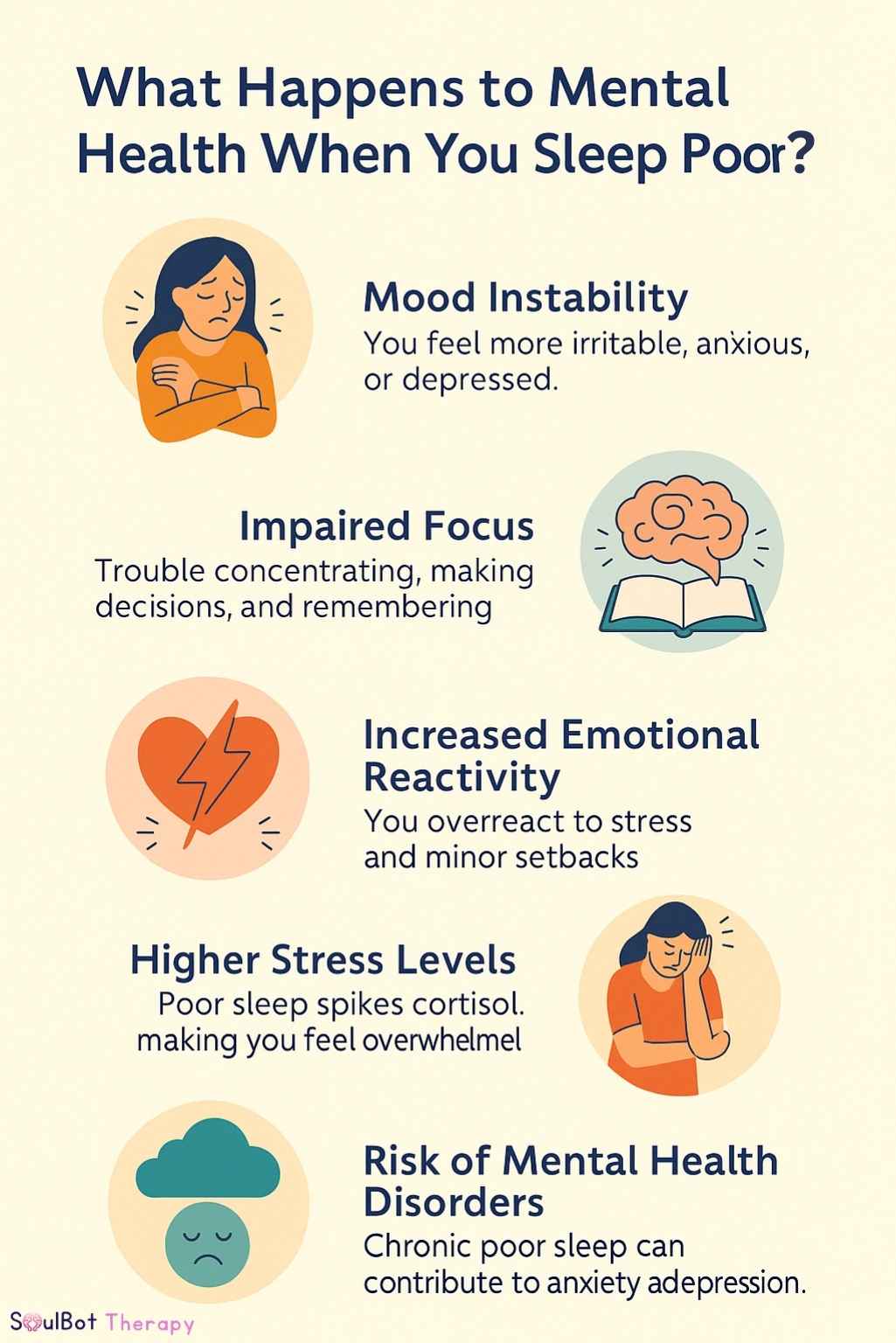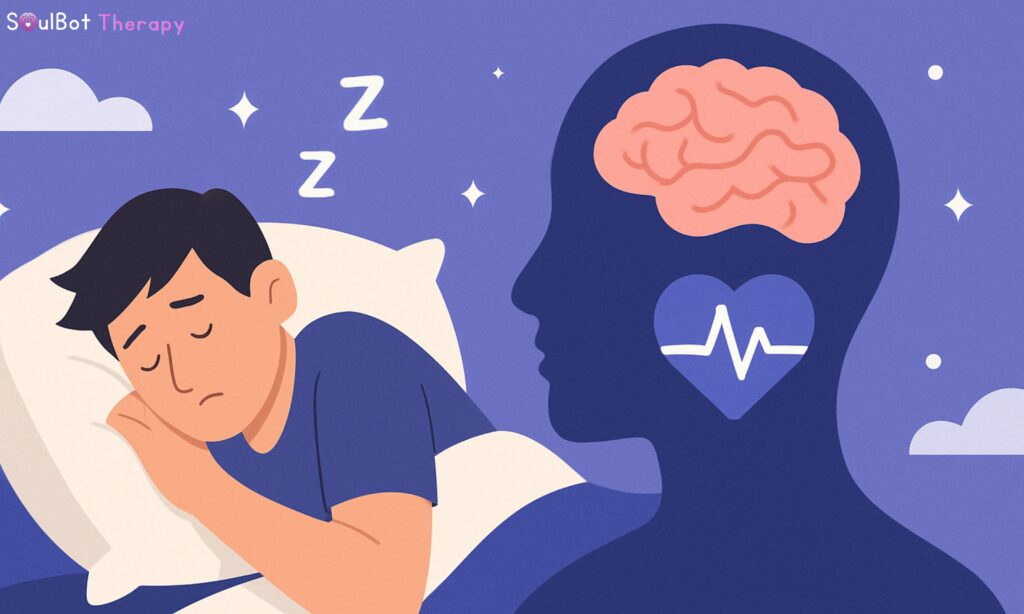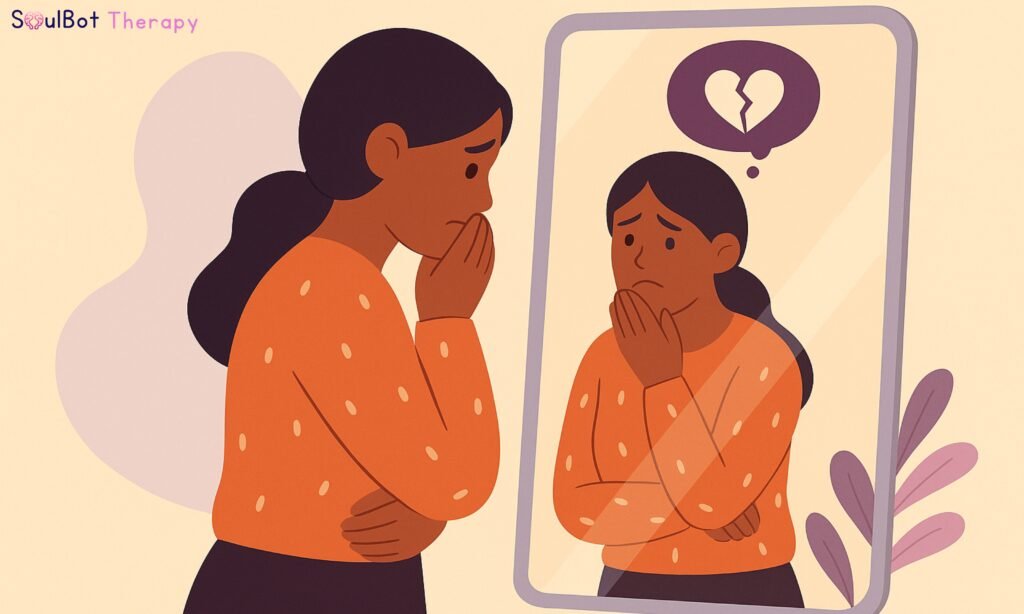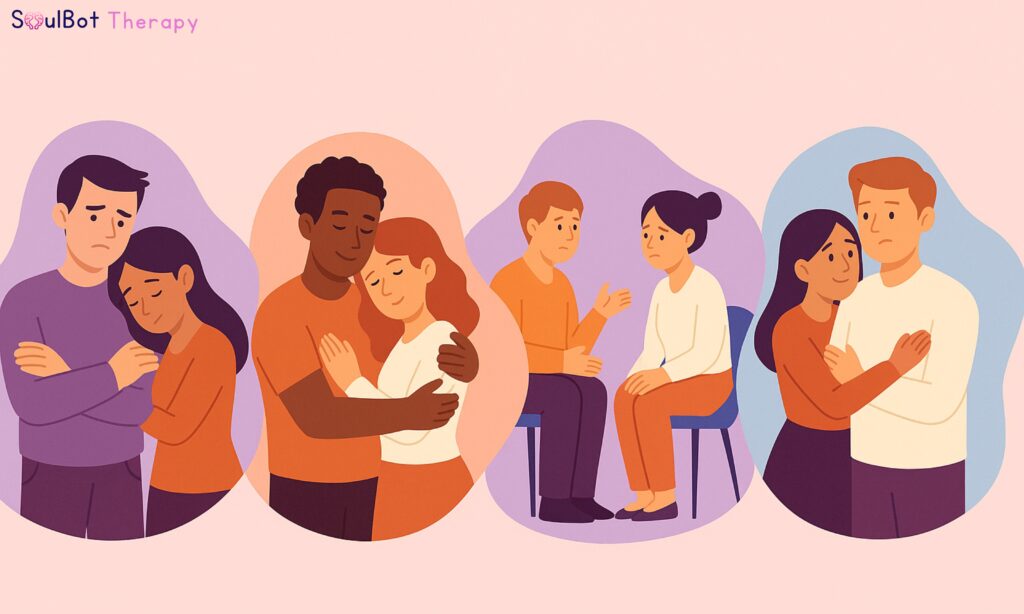Sleep and mental health are two sides of the same coin.
- When your sleep struggles, your emotional resilience drops.
- When your mental health declines, your sleep gets even worse.
If you’ve been feeling low, unfocused, and easily irritated, it might not just be stress or “life.”
It could be your mind crying out for better rest.
In this blog, we’ll explore:
- Why poor sleep affects mental health so deeply
- Real-life signs your mental health is being impacted
- How to break the toxic sleep-stress spiral
- When to seek support (and how SoulBot can help)
What Happens to Mental Health When You Sleep Poorly?
During sleep, your brain isn’t just resting — it’s repairing:
- Regulating emotional memories
- Lowering stress hormones like cortisol
- Strengthening your emotional resilience
- Refreshing your focus, empathy, and patience
When your sleep is disrupted, your brain stays in an alert mode, triggering anxiety, sadness, and impulsivity, and this is how sleep and mental health are both compromised.

📚 Learn more: How Sleep Affects Mental Health (NIH)
How Do You Know If Sleep and Mental Health Are Affecting?
Here are real emotional symptoms — beyond just “feeling tired.”
1️⃣ You’re More Irritable and Snappy
Tiny inconveniences — traffic, a slow email, someone’s loud chewing — trigger major outbursts.
If you notice your frustration tolerance crashing, your brain may be exhausted.
2️⃣ You Feel Emotionally Numb
Poor sleep doesn’t just make you emotional — sometimes, it makes you emotionless.
- You feel disconnected from joy.
- You struggle to empathise.
- You stop reacting to things that usually mattered.
3️⃣ You Wake Up Anxious — Or Dread Going to Bed
If mornings start with dread and nights are filled with racing thoughts, it’s not just bad luck.
It’s cortisol surges, disrupting your emotional rhythm.
4️⃣ You Struggle to Focus or Make Simple Decisions
Sleep deprivation affects your executive function, the part of your brain responsible for clarity, planning, and emotional regulation.
Forgetfulness + irritability = classic emotional exhaustion sign.
5️⃣ You Crave Isolation (But Feel Worse Alone)
- You cancel plans.
- You ghost friends.
- You withdraw — but don’t feel any better for it.
This loneliness loop is standard when poor sleep affects emotional connection.
6️⃣ You Feel Hyper-Sensitive to Criticism
Lack of sleep amplifies fear and shame triggers.
A simple feedback email may be a personal attack.
You’re not overly sensitive — you’re under-rested.
7️⃣ You Can’t “Switch Off” Even When Exhausted
You feel tired but wired — body exhausted, brain spinning.
This is a sign your nervous system is dysregulated, trapped in survival mode.
How Poor Sleep Traps You in a Stress Spiral?
| Sleep Issue | Emotional Effect |
| Difficulty falling asleep | Pre-bedtime anxiety spike |
| Waking up during the night | Panic attacks, irritability |
| Sleeping but feeling unrested | Low mood, lack of motivation |
| Irregular sleep-wake cycles | Depression symptoms increase |
How to Start Healing Your Sleep and Mental Health?
✅ 1. Focus on Emotional Wind-Down, Not Just Routine
Before bed, try:
- Naming 3 emotions you’re carrying
- Journaling your stressors (so your brain can offload)
- Gentle breathing exercises
✅ 2. Wake Up at the Same Time Daily (Even If Bedtime Fluctuates)
Circadian anchoring (fixed wake-up time) restores emotional regulation faster than strict bedtimes alone.
✅ 3. Validate Yourself: Sleep Struggles ≠ Weakness
Struggling to sleep doesn’t mean you’re failing at life. It means your brain is trying to protect you from perceived threats — emotional, not logical.
You’re not lazy. You’re tired in ways people can’t see.
Want to Check If Your Sleep Is Affecting Your Mental Health?
Take our free Sleep Quality Test to reflect on:
- Your emotional fatigue levels
- Night-time worry cycles
- Morning energy patterns
🧠 Take the Sleep Test →
🔗 Related SoulBot Reads
- Why You’re Always Tired (Even After 8 Hours of Sleep)
- 5 Things That Might Be Ruining Your Sleep
- How to Reset Your Sleep Schedule (Even If You’re Anxious)
Final Thought: Your Brain Needs More Than Sleep — It Needs Safety
You don’t just need hours. You need rest that feels emotionally safe. Sleep isn’t broken if your mind is restless, heavy, or disconnected. It’s begging for help.
🧠 Book a Free Consultation
or
🛌 Take the Sleep Quality Test → and discover what’s happening beneath the exhaustion.
FAQ: Sleep and Mental Health
- Can anxiety cause sleep issues?
Yes — anxiety increases cortisol, making it harder to fall and stay asleep.
- How much sleep do I need for emotional health?
Most adults need 7–9 hours of restorative sleep — deep, continuous, not just hours in bed.
- Should I see someone to see if my sleep and emotions are worsening?
Absolutely. Emotional exhaustion + sleep disruption often require emotional support, not just sleep hacks.




